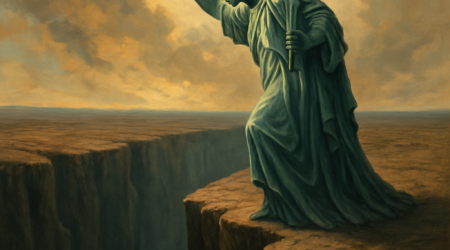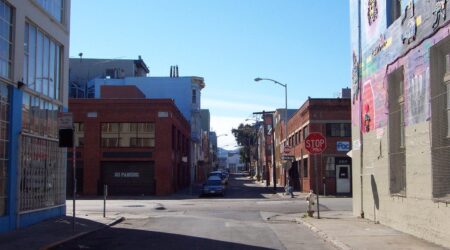Liberal Fascism
My name is Jonathon Stone and I am the child of immigrants from the former Soviet Union, a 1st-generation American, and a conservative Jewish patriot. I love this country because it was the shining beacon of hope for my family, who risked everything to escape the tyranny of Soviet communism. My father’s family came to America in 1975, and my mother’s in 1978. Throughout the 1980s, both families worked incredibly long hours using their newfound freedom to create a better future for their children. My mother’s parents were even able to establish a successful Russian food store which became the staple of the San Francisco Russian community. My parents met in San Francisco in the early 1990s, at a time when American optimism for the future was at an all-time high. After the fall of the USSR, it seemed that justice and freedom defeated the forces of oppression, tyranny, and evil. The good guys won, didn’t they? Although the evil empire responsible for spreading communism was defeated, their ideology persisted and penetrated the United States. Our universities and public K-12 schools have become infected with a foreign and subversive ideology that will undermine American values in the name of liberalism and “social justice.” When I came to this realization as an undergraduate student at UC Davis, I decided to dedicate myself to becoming a history teacher. I did not want future generations to be brainwashed into giving away the liberties that made America uniquely great in the first place. Shortly before graduating with a Bachelor’s in History, I applied to the UC Davis School of Education to pursue a teaching credential.
 I didn’t know at the time that my conservative values would be an obstacle to completing my goal of becoming a teacher in California, my home state.
I didn’t know at the time that my conservative values would be an obstacle to completing my goal of becoming a teacher in California, my home state.
I was raised to believe that anyone could succeed in America if you worked hard, that your race and gender didn’t matter, that your political opinions would be respected even if someone disagreed. In California this is no longer the case. One-party rule by radical Democrats has turned this state into a dystopian nightmare straight from a George Orwell novel. Speaking out against the radical consensus in California makes you a target, a free-thinker who should be subject to investigation. Even something as simple as owning a gun is cause for suspicion among leftists who have been taught to fear gun-owners by the news media. In the following pages I will tell the story of how I came to be investigated and ultimately removed by the UC Davis School of Education.
It began with a meeting with my supervisors. Teaching history is a controversial occupation, and politics often influence how history is taught. Political topics came up frequently during the lectures I attended at the School of Education. I was discussing political issues with a colleague just before one of these lectures, and other colleagues apparently overheard our conversation. Without speaking to me, they contacted our supervisor to have a meeting with me about it. A week later, during the meeting with this supervisor, I was told that something I said offended one of my colleagues. I was surprised, considering that I was always respectful when carrying these conversations with my colleagues who disagreed. During the meeting I asked my supervisors which comments my colleagues found offensive, and they wouldn’t tell me. They received six different emails about comments I made, but couldn’t tell me what the comments were. When I asked them how they knew what I said, my supervisors changed the subject, saying that it wasn’t necessarily what I said, but how I said it. I told the supervisors that if I don’t know what I said, there would be no way I could prevent this from happening again in the future. I asked them how this didn’t limit my ability to think and speak freely. They responded, “of course you have the right to freedom of speech, but this is an issue of sensitivity to others’ perceptions and experiences.” Basically, I could say anything I want as long as I ran it through the filter of my colleagues’ (who I barely knew) sensitivity. They referred me to the UC Davis Community Guidelines, and warned me that if my “offensive” behavior continued, they may have to remove me from the credential program.
The aforementioned meeting with my supervisors would not have been necessary if my colleagues were not so easily offended, but for the time being I gave my colleagues the benefit of the doubt since I barely knew them. Perhaps something I said was actually offensive, although the lack of information regarding the “incident” made me suspicious. I began paying closer attention to my colleagues’ behavior in our classes. Over the next few weeks I realized how sensitive many of my colleagues were. They sometimes cried during our weekly seminar discussions with our supervisor. During one such discussion about the American Civil War, a colleague (the only non-radical in the group besides myself) brought up an 1862 quote from Abraham Lincoln: “If I could save the union without freeing any slaves I would do it; and if I could save it by freeing all the slaves I would do it.” My colleague made the reasonable argument that the Civil War was fought to preserve the Union, not necessarily to free slaves despite the fact that slavery was an important issue. This elicited quite a reaction from my other colleagues. Supporting my friend’s rational argument, I explained that when studying and teaching history, we have to be careful to avoid ahistorical thinking (looking at history through the lens of our modern ideas, such as judging the founding fathers as bad men for owning slaves). A colleague then made the comment that “when it comes to some parts of history, there are not two sides,” implying that there is only one acceptable narrative and that anyone who disagreed with her was simply wrong. This was well-received by the rest of the class and my supervisor, who nodded along passionately. I was disturbed by this rhetoric, but even more disturbing was the fact that after reading Howard Zinn’s A Young People’s History of the United States—a book recommended by our instructor—nearly every one of my colleagues wanted to use the book in their high school and middle school classrooms.

Zinn self-identifies as an anarchist and a socialist, and his book is filled with a version of American history that uses Marxist language of oppression—applied to race and gender—to paint the United States as a bad place. Nobody questioned anything in the book despite the fact that there are no references or footnotes in the book.
This because Zinn’s revisionist history fit well with their left-wing worldview, they were victims of confirmation bias. I realized that my colleagues were not thinking critically, slowly being brainwashed to indoctrinate their future students with biased versions of history. Indeed this is one of the goals of the UC Davis teaching credential program, to train its student teachers to advocate for social justice.
I began noticing the left-wing radicalism of my colleagues more frequently. At the first meeting of one of our lectures, the professor led an ice-breaker activity where we took turns explaining who we are and why we want to become teachers. One colleague in the English cohort described her passion for social justice, prompting head nods from my fellow History cohort members. After she finished, my History cohort colleagues quickly raised their hands to speak next. One colleague who was a few years older than most of us described his time as a protestor during the Occupy Wall Street movement in 2011. He critiqued capitalism throughout his passionate speech. At one point during his monologue a fellow History cohort colleague blurted “down with capitalism!” To my astonishment, this prompted head nods and even cheers of agreement from my colleagues. At that moment I knew that many of my colleagues were radical leftists, but the truly frightening thing was that they will soon be teaching American History to the next generation. The combination of extreme sensitivity and radical political beliefs among my peers created an environment in which I couldn’t express any semblance of conservative views, or else I would be reported to my supervisors for offensive speech. The most radical of my peers became the Thought Police, easily able to cause problems for me by using their heckler’s veto.
To understand how the university forced me out of the credential program, I must first explain how the program functioned. Each student teacher was assigned to a long-term and a short-term placement at different schools and different levels. At each school we were paired with a resident teacher who would mentor us as we slowly took on more responsibility in the classroom. My long-term placement was at a middle school in Vacaville and my short-term at a high school in Sacramento. Below is a sketch of what my schedule was supposed to look like for one school year:
| SUMMER ‘18 (August-September) | FALL ‘18(October-December) | WINTER ‘19 | SPRING ‘19 |
| OBSERVATION PHASE (LONG TERM) |
SHORT-TERM PLACEMENT | LONG-TERM PLACEMENT | LONG-TERM PLACEMENT |
The observation phase was implemented for us student teachers to get acquainted with how a classroom operates and how our resident teachers handled everything. After a short-term placement during fall quarter we would return to our long-term placements and take over the classroom entirely. I completed the summer observation phase without any problems and built a good relationship with my resident teacher, who gave me excellent teaching advice that will stay with me for years to come. As September came to an end, I was excited to transfer to my new school in Sacramento. Just before fall quarter began, the history cohort held a meet-and-greet with every student teacher and resident teacher to meet our new short-term teachers. My new teacher and I spent the entire two hours talking, cementing my excitement for the new quarter to come. All seemed to be well, but then suddenly everything changed dramatically.
One afternoon in late September I received a vague e-mail from an administrator of the program requesting my presence at a meeting. Knowing how the previous meeting with these folks went, I was nervous and immediately suspected the worst. When I sat down in the conference room at the School of Education building I was greeted by two administrators who told me that I would not be able to proceed with the short-term placement. The high school in Sacramento found a photo of me holding an AR-15 and a Colt .45 while wearing a Make America Great Again hat.
 I took the photo on July 4th during a trip to visit my dad in Florida, and I posted it on my Instagram account. My account had all privacy settings set to maximum, theoretically only people I authorized were allowed to see it—of course I deleted this photo from the page immediately after the meeting and then removed all potentially controversial posts from my social media out of fear. Because of this photo, the high school in Sacramento told UC Davis that they would not have me at their location. Their fears prompted the university to investigate me, and halfway through the meeting the administrators brought in a police detective to speak with me about my history with firearms. Knowing that I did nothing wrong, I cooperated fully with the detective, answering questions about whether I owned any guns, where the aforementioned photo was taken (proven by location services on the iPhone’s photo app), and how many guns my father owned. After our discussion the detective cleared me, there was nothing illegal about anything I did or posted online. The high school did not wait for this investigation before determining they wouldn’t have me teach there, so the administrators at UC Davis—who were responsible for contacting schools on my behalf—assured me they would find another school in their network within a 40-mile radius. They asked me to write a short letter explaining why I was looking for a new school in the middle of the school year. I wrote the following letter which the administrators sent to each of the schools they contacted:
I took the photo on July 4th during a trip to visit my dad in Florida, and I posted it on my Instagram account. My account had all privacy settings set to maximum, theoretically only people I authorized were allowed to see it—of course I deleted this photo from the page immediately after the meeting and then removed all potentially controversial posts from my social media out of fear. Because of this photo, the high school in Sacramento told UC Davis that they would not have me at their location. Their fears prompted the university to investigate me, and halfway through the meeting the administrators brought in a police detective to speak with me about my history with firearms. Knowing that I did nothing wrong, I cooperated fully with the detective, answering questions about whether I owned any guns, where the aforementioned photo was taken (proven by location services on the iPhone’s photo app), and how many guns my father owned. After our discussion the detective cleared me, there was nothing illegal about anything I did or posted online. The high school did not wait for this investigation before determining they wouldn’t have me teach there, so the administrators at UC Davis—who were responsible for contacting schools on my behalf—assured me they would find another school in their network within a 40-mile radius. They asked me to write a short letter explaining why I was looking for a new school in the middle of the school year. I wrote the following letter which the administrators sent to each of the schools they contacted:
“To Whom it my concern,
Hello, my name is Jonathon Stone and I’m a student teacher at the University of California, Davis. You may be wondering why I do not have a student teaching placement at this point, and I’d like to provide context to explain why this is the case and assure you that I am a qualified and professional person to teach at your school. I was originally assigned to River City High School in West Sacramento for my short-term placement (October-December), but the school obtained a picture of me holding an AR-15 with a 30-round magazine. As such, the weapon is illegal in California, however the aforementioned picture was taken in Florida (where 30-round magazines are legal) on a trip to visit my father. A detective associated with UC Davis spoke with me and after further investigation, confirmed that there was no issue of illegal weaponry since the weapon was registered with my father who lives in Florida and the picture was taken there. River City High did not wait until the investigation was concluded before they made the decision to not allow me to teach at their school.
I have many strengths to bring to your school. I am passionate about teaching history, and I believe that an informed population is crucial to a functioning democracy. I hope to teach my students how to think, not what to think. Although I may have some political disagreements with my colleagues, I have always remained professional at my student teaching site and never brought my personal opinion into the classroom. I spent several years as a martial arts instructor in the San Francisco Bay Area when I was a teenager, and have worked as a substitute teacher at middle schools and high schools since March of this year. Throughout these experiences and especially at my teaching placement thus far, I’ve learned how to teach diverse student populations and promote equity in the classroom regardless of race, gender, religion, sexual orientation, or any other distinguishing factor. I am skilled at culturally relevant pedagogy, always trying to make connections to my students’ prior knowledge to engage them in the content. In my classes at UC Davis I am learning cutting-edge pedagogical theory that I will apply to my classroom as best as I can. With these skills, I can be a valuable asset to your school.
I was fully cooperative with the UC Davis School of Ed throughout the investigation into the photo mentioned above, and if you have any more questions I am more than happy to answer them. I sincerely hope you will consider allowing me to teach at your school, thank you very much for taking the time to read this letter.
Sincerely,
Jonathon Stone”
Weeks went by as the fall quarter began and my peers transferred to their short-term placements. After nearly a month in limbo, attending university classes but not teaching at any school, I was once again called into a meeting with the administrators. This time, however, the dean of the School of Education was present. She told me that they were unable to find any school in their network to take me. When I asked why, she replied that no school was obligated to give UC Davis a reason for not accepting me. I will never know why I was denied by every school in their network. I suspect that UC Davis was negligent in their communications with these schools, and did not advocate strongly enough for me. One thing was clear: I was out of any short-term placement. I asked if I could simply return to my long-term placement, and their answer stunned me. They told me that now even my long-term placement did not want me to return in January. I would not have enough student teaching hours to earn a credential through the program. The administrators offered me an idiotic choice: continue taking classes at UC Davis but earn no credential at the end, or withdraw from the program. Not much of a choice, so I chose to withdraw in late October. The school refunded my fees for summer and fall. A week later I went to my former long-term placement to return textbooks that I had borrowed, and I had a brief conversation with the principal about why I was not allowed back. To my surprise and amazement, she told me that UC Davis told her that I would not be returning, contradicting what the UC Davis administrators told me: that my long-term placement did not want me to return. Somebody lied to me. I was “handled” by the UC Davis School of Education administrators because I was a conservative. They didn’t want me to earn a credential at their school because their mission is to promote social justice in public schools, and I wouldn’t blindly accept their dogma as my colleagues did.
Let this be a lesson to all young conservatives: be extremely careful what you post online, consider your career because anyone’s interpretation of something you say can lead to problems with the Thought Police.
On college campuses the combination of hyper-sensitivity and political radicalism has led to the creation of Thought Police on campus. If you say anything which doesn’t match the accepted narrative, you are socially ostracized and sometimes reported to authorities. This is the state of modern American universities, formerly the great bastions of freedom of thought and expression. Now they are like George Orwell’s Ministry of Truth, perpetuating a politicized narrative while crushing any opposition to their monopoly on truth. When I told my grandparents this story, they were horrified. It reminded them of the bureaucratic “handling” and worse that occurred so frequently in the USSR, and they never imagined it would be similar here in the United States of America. We who lived through the horrors of communism must be willing to speak loudly to preserve our values, or else this great country will be doomed to repeat the catastrophic mistakes of the 20th Century.
Due to the fact that I live in a very liberal area, for employment purposes I changed my name in this article to conceal my identity. This is necessary in liberal areas such as Northern California where young conservatives like myself are forced into silence by their supposedly “tolerant” liberal peers. Being openly conservative is not wise if you want a successful career in a liberal area. If you would like to contact me to show support or to help otherwise, please email the newspaper at js@kstati.net. Thank you for reading!
От редакции:Мы печатаем это письмо и, честно говоря, не можем, не считаем нужным скрыть свое восхищение перед мужеством этого молодого человека и перед его способностью не поддаваться промыванию мозгов и не шагать строем в толпе. Ждем ваших писем, которые отправим ему.
Jonathon Stone





